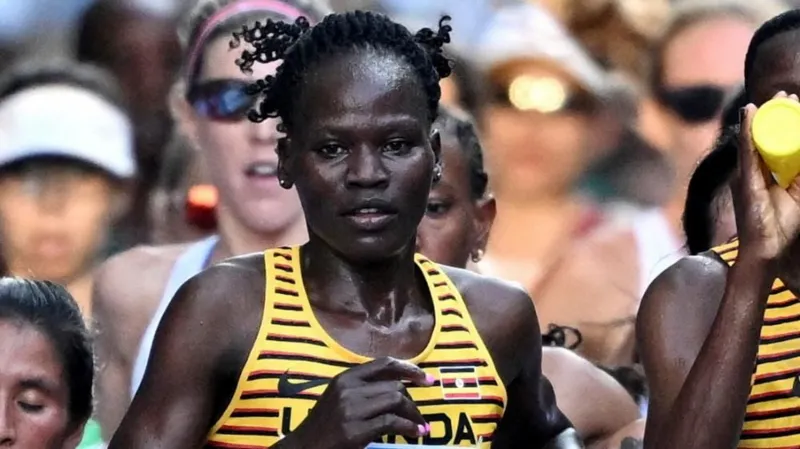The ex-boyfriend of Ugandan Olympic athlete Rebecca Cheptegei has died in a tragic incident. The incident took place in northwest Kenya, where the athlete lived and trained. The attack and subsequent deaths have shocked the local community and drawn attention to the growing issue of gender-based violence in the region.
Horrific attack
33-year-old marathon runner and Olympian Rebecca Cheptegei was attacked by her former partner Dickson Ndema while returning home from church a week ago. According to witnesses and local officials, Ndema sprayed petrol over her and set her on fire. The reason behind the horrific attack was said to be a dispute over a small piece of land in the area.
Neighbours described the horrific scene that unfolded. “We heard her screams and then we saw her running towards us, engulfed in flames, screaming for help,” said a local resident who witnessed the incident. The community was left in shock by the cries for help and the sight of the athlete burning to death.
Both died of injuries
Cheptegei suffered severe injuries, with burns covering 80% of his body. He was rushed to Moi Teaching and Referral Hospital in Eldoret, but died four days later. Ndiema, who suffered burns during the attack, was also admitted to the same hospital with burns over 30% of his body. He remained in the intensive care unit for several days before he too died on Monday night.
Hospital official Dr Owen Menach confirmed Ndiema’s death, saying, “It is true that she died of burns.” Both Ndiema and Cheptegei were receiving treatment at Moi Hospital before their deaths, but their injuries were so severe that they did not survive.
Against the backdrop of rising violence against women in Kenya
The attack on Cheptegei has raised concerns about the safety of women in Kenya, especially those in difficult relationships. Unfortunately, this is not an isolated incident. Cheptegei’s death is the third case in the last three years of an athlete being murdered by her intimate partner in Kenya. In 2021, world record holder Agnes Tirop was stabbed to death, and just six months later, another athlete, Damaris Mutua, was strangled to death.
Cheptegei’s story highlights the growing crisis of domestic violence in Kenya. A national survey in 2022 found that at least 34% of women in Kenya have experienced physical violence. The case of Cheptegei, a renowned athlete, has again drawn attention to this disturbing trend, leading to calls for stronger legal protections and awareness campaigns to tackle gender-based violence.
A life dedicated to running and her country
Born on the Kenyan side of the Kenya-Uganda border, Rebecca Cheptegei always dreamed of a career in athletics. When opportunities did not present themselves in Kenya, she decided to cross the border to Uganda to pursue her passion. She joined the Uganda People’s Defence Forces (UPDF) in 2008 and pursued her athletics career, rising to the rank of sergeant.
Cheptegei’s journey to the Olympics was marked by determination and perseverance. She competed at this year’s Paris Olympics, representing Uganda in the marathon. Although she finished 44th, her community in Bukwo, Uganda, celebrated her as a “champion.” To them, she was more than an athlete; she was a symbol of hope and pride. Her death has left her family, friends and the entire region in mourning.
Land dispute and legal proceedings
Local administrators have reported that the conflict between Cheptegei and Ndiema stemmed from a dispute over a small piece of land in northwest Kenya. Land disputes are not uncommon in the region, often leading to tension and, in some cases, violence. However, the fatal attack on Cheptegei shocked the community, who were unaware that the conflict had escalated to such an extent.
Following Cheptegei’s death, police announced that they were treating his death as a case of murder and named Ndiema as the primary suspect. Before her death, Ndiema could have faced charges for the brutal attack on Cheptegei. Her death has put an end to potential legal proceedings, but it has not silenced the voices calling for justice and action against domestic violence.
Calls for action and justice
Cheptegei’s tragic death has sparked outrage and renewed demands for justice, especially for women who are victims of violence. Activists, athletes and community leaders have urged the government to implement stronger measures to protect women and address the root causes of domestic violence.
Prominent Ugandan athletes and sports organisations have also expressed their condolences and called for greater awareness and support systems for women experiencing domestic abuse. They stressed the need for counselling, legal aid and safe shelters for women at risk. Many believe Cheptegei’s death should serve as a warning to society and the authorities
